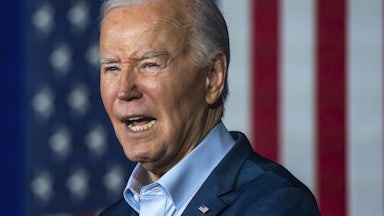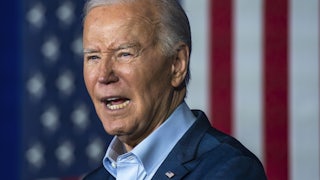Will the Democrat-controlled Congress advance any meaningful climate change mitigation? There is hope that it might: The budget reconciliation bill currently being debated takes substantive aim at the problem with a slew of solutions, ranging from petrochemical industry reform, investments in alternative energy, the creation of new jobs and job transitions, and upgrades to the nation’s climate resilience infrastructure. Scientific American enthused that the “reconciliation bill … could cut U.S. greenhouse gas emissions by nearly a gigaton by 2030”; the Center for American Progress lauded it as an “extraordinary legislative response that would set the world on a different path”—away from “suffering” and “instability.”
At the moment, this is all in flux: Congressional Democrats are working through their factional differences, and the budget bill may end up getting whittled down considerably. Whether the climate change provisions are saved or sacrificed depends on how the debate proceeds and which forces influence those discussions.
In that regard, an ominous development could be afoot. As TNR contributor Jake Bittle recently reported, a new voice has joined the chorus of climate mitigation opponents: the self-styled “skeptical environmentalist” Bjorn Lomborg, who contends that while climate change is real, the cure is more costly than the malady. The right has begun to embrace Lomborg’s notions, but that’s no surprise. The question is whether his ideas may prove to be alluring beyond the conservative movement. What’s most concerning is that Lomborg’s argument redirects the climate debate away from the familiar terrain of denialism toward a new and dangerous “kind of sociopolitical opposition,” Jake wrote.
The climate change dispute has traditionally been one in which climate skeptics and denialists spar with scientists and advocates over empirical evidence of a warming world, some for reflexively partisan reasons, others because they are essentially on the take from the fossil fuel industry. But the momentum behind a solution to climate change has always been buttressed by a sturdy and unwavering scientific consensus that denialists have struggled to dislodge.
The durability of this consensus has paid healthy dividends. Climate scientists produce regular progress updates that maintain and focus the attention of policymakers; they also help to identify phenomena that demonstrate how a changing climate is impacting our lives right now. But the most important role they play is as an engine of unity. Important measures such as the Paris climate accord would not be possible without climate scientists constantly reminding us, with one voice, that we’re all in this together, thus creating a structure for nations around the world to join together in its defense.
Lomborg’s brilliant villainy is that his ideas could disrupt this global unanimity. Once the climate conversation shifts from a debate over empirical science to one of government spending and debts, the consensus begins to break down. A more splintered universe of stakeholders—deficit hawks and austerians, skittish Democrats, and a Beltway media that reflexively expresses its mistrust of liberal governance by relentlessly asking, “But how will you pay for it?”—are invited into the conversation. And that Lomborg doesn’t dispute the science itself opens the door for this new array of skeptics to shake off being characterized as “climate deniers.”
There are countless examples in which efforts to materially improve the economic conditions of the American people have foundered on the shoals of deficit hackery and austerity fanatics who serve the interests of capital—as well as a media that takes the prospect of doing nothing at all as a legitimate side in the debate. Cracks in the consensus about how money can and should be spent have waylaid the advancement of single-payer health care plans, and keep long-standing earned-benefit programs like Medicaid and Social Security under constant threat.
But there’s no better way to gauge how much traction Lomborg’s ideas might gain in the climate change debate than to look at what’s happening in Washington as the budget reconciliation bill gets nibbled down in negotiations. There, the same skeptical ideology Lomborg would import to climate change maps perfectly across the factions within the Democratic Party that have spent the past few months arguing. This has been billed as a debate between moderates and leftists; it’s perhaps better envisioned as a battle between those who would spare no expense to help Americans in crisis and those who aren’t entirely sure that every American merits that taxpayer largesse.
The strongest weapon against the existential menace of climate change is solidarity. I suspect that Lomborg’s new GOP acolytes, from The Wall Street Journal to Breitbart, know that the innovative new skein of skepticism he’s weaving could cleave apart the alliances here at home that have made a cooperative, global response even somewhat possible. When it comes to ameliorating the impact of climate change, the stakes could not be higher. Whenever anyone asks, “How much should it cost to save the planet?” remember—the answer is: If we do nothing, it will cost us everything.
This article first appeared in Power Mad, a weekly TNR newsletter authored by deputy editor Jason Linkins. Sign up here.








